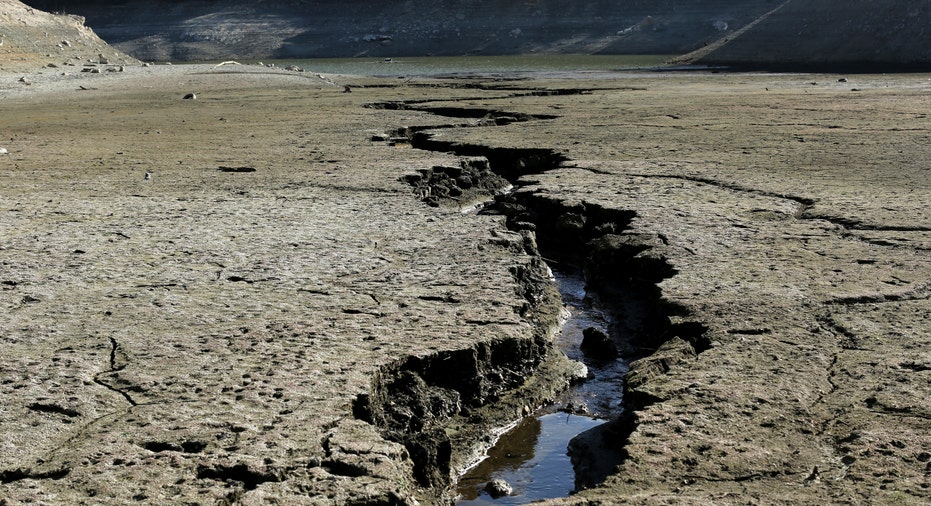Calif. Rancher Still Optimistic Amid Record Drought

A record-breaking drought this winter – usually California’s rainy season – is wreaking havoc on the state’s cattle ranchers, whose livestock depend on grasses.
“Forage production is ten times below normal forage levels,” says UC Davis researcher Leslie Roche, co-author of last month’s study on the drought’s effect on ranchers. “Water is the number one limiting resource, so it’s a huge deal.” She says it was the first January on record that there were no inches of rain measured outside of the Sacramento area.
Many of California’s multi-generational cattle ranchers have been selling off at least some livestock to ranchers in the Midwest, who are better prepared to feed their cattle. While some are supplementing the cattle’s diet with hay, others say the prices are just too expensive.
“Our cattle eats 50,000 pounds every four to five days, and it costs –if you can find it – between $5,000 and $6,000 per load,” says Yolo Cattle Company co-owner Scott Stone, whose ranch is situated in Woodland, Calif. Much of the hay is being shipped in from Oregon, Idaho and Utah.
And though cattle prices are high, the cows being put up for market are fetching lower prices.
“It’s a problem selling the cows. They’re in a poor condition, because you’re feeding them hay, which is not like grazing on regular grass,” says Stone. He usually keeps some calves over the winter so they can put on more weight, but instead sold them all this year for between $500 and $600 a head.
Seventh-generation cattle rancher Todd Swickard has also been selling off calves from his Five Dot Ranch using video auctions.
“A lot of the calves have gone back to the Midwest, where they are recovering from a drought there but having a good year with a good feed supply,” says Swickard. He says he’s sold calves for as much as $900 per head.
Consecutive Dry Years Take a Toll
But this isn’t the first bad year, as ranchers say luck has been dried up for a while.
“2013 was the driest on record for the state, and now we’re into another year with the drought continuing … it keeps compounding,” says Swickard.
At this point, the ranchers say they need much more than a good sprinkle to kick their businesses into gear.
“It takes an inch of rain to get grass started, and for the past five months we’ve had no grass growing whatsoever,” says Stone.
Effects on Food Prices
Though cattle prices have been rising for California farmers, UC Davis agricultural economist Dan Sumner says it’s highly unlikely that consumers will get hit at the grocery store.
“The California cattle industry is small relative to the national beef supply. What happens here won’t affect meat prices,” says Sumner.
He says it’s unlikely prices will increase even for crops like lettuce – a category in which California growers have a more significant presence.
“We have enough groundwater in coastal valleys to cover high-priced vines and produce like lettuce and celery,” says Sumner. Instead, he says farmers will likely cut back acreage for crops like cotton, alfalfa and corn.
“I don’t think food consumers will notice very much,” he says.
Optimism Prevails
While Zaca Ranch co-owner Alex Fleming says it’s the worst weather on-record since the 1840s, other ranchers are comparing the weather to a more recent drought – and are seeing a bright side.
“They tell me it’s nothing compared to 1924,” says Rankin Ranch owner Bill Rankin, whose great-grandfather started the ranch in 1863. “I heard a guy the other day say in ’24, it just didn’t rain at all in this area.
“Sometimes we think there are more dry years than wet years … We’re just in a cycle, and we’ll cycle around,” says Rankin.
But if it rains any time soon, the ranchers say their problems won’t go away overnight.
“The conception of the cow … it’s close to a three-year process, from conception to harvest,” says Swickard. “It takes a long time to recover. As we reduce numbers, we can’t bounce back [instantly].”
But come what may, Yolo Cattle’s Stone says he won’t lose faith.
“If you’re not an eternal optimist, you shouldn’t be in agriculture,” he says. “You’re always rolling the dice: There’s a lot of risk and a lot of money at stake. “



















